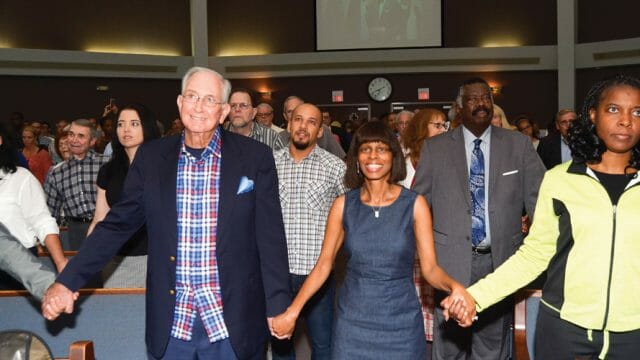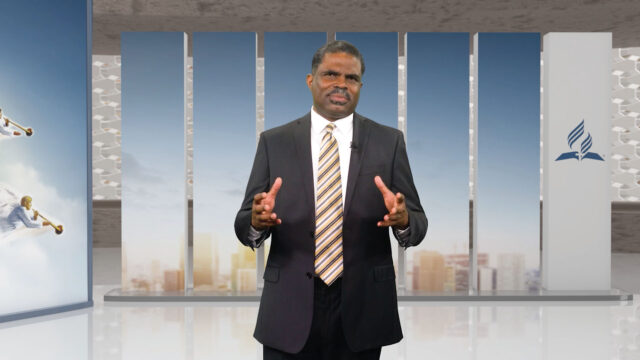Making Truth Understandable

In the beginning Zamira1 was just a language study partner, but soon we became close friends. When we started studying the Bible together, her family looked on approvingly, even allowing her to place an Arabic Bible on the same shelf beside the Qur’an.
At first Zamira liked to pick and choose from Scripture. She loved the stories, but I noticed she blacked out large sections of the Gospel of John with a Sharpie marker. Anything that insinuated the divinity of Christ was problematic for her.
We took it slow and studied step by step. Eventually she accepted the inspiration of Scripture. Then she accepted the truth of Jesus’ death on the cross for her sins—a major step for a Muslim.
But as we studied the divinity of Jesus, she began to realize that there is a point of disjuncture between Islam and Christianity. She drove our studies with intense, searching questions, and I did my best to answer them. I can still remember the day we finished our last study about the divinity of Christ.
“I understand it,” she said very quietly. “It all makes sense.” There was a long pause.
“If the things we are studying are true,” I asked gently, “What should be our logical response to Jesus?”
“We should worship Him,” she said without hesitation.
“Zamira, would you like to worship Jesus—not just as a great prophet from history, but as your Savior . . . and your God?”
For a moment her eyes filled with tears. I could sense conviction, fear, and earnestness. But Zamira did not decide for Christ that day. Instead she inexplicably and painfully ended our Bible studies and our friendship. A few weeks later she left the country, and I’ve never seen her again.
What Went Wrong?
In our God-given task of sharing the three angels’ messages with the world, we engage in the important process of “missional optimization,” sometimes called “critical contextualization.” This is a theology-driven attempt to develop better explanations and practices for mission.
My own experience with Zamira gave me a deep interest in missional optimization. I wanted to know what I could have done better. Could I have explained the message more clearly? Should I have spent more time addressing Zamira’s social concerns with accepting the truth? Were there deep, worldview-level objections to Trinitarian theology that she could not articulate and I could not answer? Most likely the truth involved all these and more.
Perhaps you have your own story of unsuccessful witnessing. Certainly, only God fully understands how a person will be impacted by our witness, and many non-Christians have been drawn to Christ through awkward and poorly presented explanations of the gospel. The Holy Spirit works despite our failures. Nevertheless, almost everyone engaged in frontline evangelism can think of times we have walked away saying, “That did not go well!”
How can we improve our witness? More specifically, how can we improve our presentation of the vital truths of the three angels’ messages for the people groups who need it most—the world’s Muslims, Hindus, Buddhists, Jewish people, and post-Christians? Perhaps a key for all of us can be found in the principles of missional optimization.
Why Do We Need to “Improve” Mission?
Did you know that most of our converts come from other Christian churches? Even in the 10/40 window, where we plant churches in the heart of Buddhist, Hindu, and Muslim nations, very high percentages of our indigenous church members have joined our church from other Christian denominations.
This is not surprising. A zoomed-out look at our missional methods reveals a plethora of books, tracts, evangelistic sermons, and Bible study guides created by Christians for Christians. When we share literature or preach about the three angels’ messages, we tend to assume our audience already knows how to find the book of Revelation, what an “angel” is, how creation happened, and what the commandments of God are. These assumptions reveal our hidden audience: Christians.
Imagine you are a non-Christian living in the 10/40 window, where you have grown up without the slightest exposure to biblical ideas. You, along with hundreds of millions of others, do not know who Jesus is. You do not know what a Bible is, or how to find its individual books, chapters, or verses. You don’t know the meaning of such terms as gospel, salvation, or remnant. And many of Christianity’s richest symbols—such as eating Christ’s body and crucifying self—seem downright strange and repulsive to you!
It is not only the faraway non-Christians in the 10/40 window who are confused by our teachings. Muslims, Buddhists, Hindus, Jewish people, and post-Christians are now living in Western countries. They are beside us, in our gyms, our grocery stores, our workplaces, and our neighborhoods. Wherever we are, whoever we are, there is a need for us to engage in missional optimization.
Ellen White wrote, “The people of every country have their own peculiar, distinctive characteristics, and it is necessary that men should be wise in order that they may know how to adapt themselves to the peculiar ideas of the people, and so introduce the truth that they may do them good.”2
Missional Scaffolding: The Intelligent Sequencing of Topics
As we seek to optimize our witness to non-Christians, we begin with three crucial principles. The first principle is sequence. It’s important to choose an appropriate order for sharing new spiritual topics with our non-Christian friends. Witnessing works best when we start with “common ground” topics and build upward to “testing truths.” Intuitively, we use a type of missional scaffolding, which starts where they are and builds upward to where we wish to take them.3
Such scaffolding can be seen in the predictable order of resources designed by Christians for Christians. Often the first sequence of studies or sermons will include such common ground topics as:
The validity of Scripture
Salvation through faith in Jesus’ death and resurrection
The character and love of the triune God
While these themes build rapport with fellow Christians, imagine following this sequence with a Muslim friend. These three “opener” Bible studies, perfectly sequenced for use with Protestants, introduce Islam’s top three testing truths. To share these at the outset seems calculated to prejudice a Muslim’s mind against the message. Ellen White seemed to suggest that topic sequencing is important in mission. She wrote, “Do not at the outset press before the people the most objectionable features of our faith, lest you close the ears of those to whom these things come as a new revelation.”4
As we attempt to sequence topics progressively, let’s beware of two common errors in missional scaffolding. The first error is ending too low, remaining stuck in commonalities. We fail to present the three angels’ messages in their fullness, which produces weak believers and a watered-down church. The opposite error is perhaps just as bad—starting too high on the scaffolding, presenting truth in such a way that even a basic understanding is out of reach to our target audience.
When we fail to come down close enough, making the edges of truth “reachable” to people who have never heard it before, the damage can be irreversible. Ellen White writes, “Let such portions of truth be dealt out to them as they may be able to grasp and appreciate. . . . If truth were presented in so large a measure that they could not receive it, some would go away and never come again.”5
An important part of missional optimization involves ordering our topics in progressive, manageable steps, neither beginning too high nor ending too low, so they can reach a full understanding of our message.
Words They Understand: Sensitive Terminology
A second way that we can optimize our witness to non-Christians is by adjusting the religious terminology we use. “Christian-ese” is hard to understand. Simple words that make sense in our Western, Judeo-Christian worldview may be profoundly foreign for the world’s non-Christians.
Take, for example, the word salvation. In many of the languages in India, there is no precise translation for salvation. One of the closest parallels is the word moksha, which literally means “liberation.” But this term comes with baggage, for moksha is understood as liberation from the cycle of reincarnation, when a person’s soul joins the divine unity of all life, living forever in blissful nothingness. This is clearly not what we mean when we speak to a Hindu about salvation! Using generalized terms without explanation can lead to confusion and religious syncretism.
Furthermore, just because a Hindu has emigrated to a Western nation and speaks fluent English does not mean he or she understands what we mean when we use the word salvation. Words are interpreted through the person’s underlying worldview. Unless you explain whatyou mean when you say salvation, the Hindu’s default is to interpret it with the mental schemata that already exist in his or her mind. Being mindful of the terminology we use is vital for optimizing mission. If in doubt, always feel free to ask your non-Christian friend, “When I say ———, what do you understand it to mean?”
Choosing Meaningful Topics for Them, Not Us
A third important principle for missional optimization involves the selection of topics in our evangelistic tracts, Bible studies, and evangelistic sermons.The topics we tend to emphasize reveal, once again, our hidden audience: Christians. For example, our Christian-to-Christian evangelistic resources emphasize the truth that hell is not a place of eternal torment—a teaching that plagues many conscientious Christians. But Buddhists and Hindus aren’t primarily asking about hell; they’re wondering how they can be reincarnated into a higher sphere. Do we have any Bible studies that address reincarnation in a kind, sensitive, biblical way? No? Then this is an opportunity for missional optimization.
Here is another example. Most Adventist evangelistic resources emphasize the manner and timing of Jesus’ return. In part, this is to address rapture myths, an Evangelical concern. But Muslims already believe Jesus is coming back literally and visibly. They don’t believe in a secret rapture. What they need is a study addressing the purpose of why Jesus is coming back. For them, Jesus will return as a great prophet who will kill all the pigs, break all the crosses, and make all Christians convert to Islam. Part of missional optimization involves informing ourselves on the major objections and viewpoints held by people of other faiths so that we can speak on relevant topics. We must be ready, in season and out of season, to answer their questions, not ours.
A Complex but Beautiful Task
We can do our best to optimize our presentation of the three angels’ messages, but people may still misunderstand. We can build meaningful friendships, but still be rejected. We can try to mitigate social barriers to conversion as far as possible, but fail to bring our friends to Christ.
God created each person with freedom to choose, and even well-executed witnessing may, at times, fail to save a soul. But in most cases better mission practice will translate into better soul winning. Although there is no formula for mission, we do know that improved witnessing gives people improved chances at accepting the last warning messages for our world. You can begin optimizing your witness to non-Christians by developing a mindset of customization. Believe that the full truths of the three angels’ messages can be understood by non-Christians if we present the message intelligently and with love. Dedicate yourself to becoming informed about other religions so that you can use appropriate sequencing, terminology, and topics. And as we seek to do our best in the Lord’s vineyard, let us remember: “I planted, Apollos watered, but God gave the increase. So then neither he who plants is anything, nor he who waters, but God who gives the increase” (1 Cor. 3:6, 7).
1 Not her real name.
2 Ellen G. White, Testimonies to Ministers and Gospel Workers (Mountain View, Calif.: Pacific Press Pub. Assn., 1923), p. 213.
3 For examples of how Jesus and the apostles used missional scaffolding, see Acts 2; John 16:12; The Acts of the Apostles (Mountain View, Calif.: Pacific Press Pub. Assn., 1911), p. 180; Gospel Workers (Washington, D.C.: Review and Herald Pub. Assn., 1915), p. 92; Christ’s Object Lessons (Washington, D.C.: Review and Herald Pub. Assn., 1900, 1941), p. 263.
4 Ellen G. White, Evangelism (Washington, D.C.: Review and Herald Pub. Assn., 1946), p. 141.
5 Ibid., p. 142.









